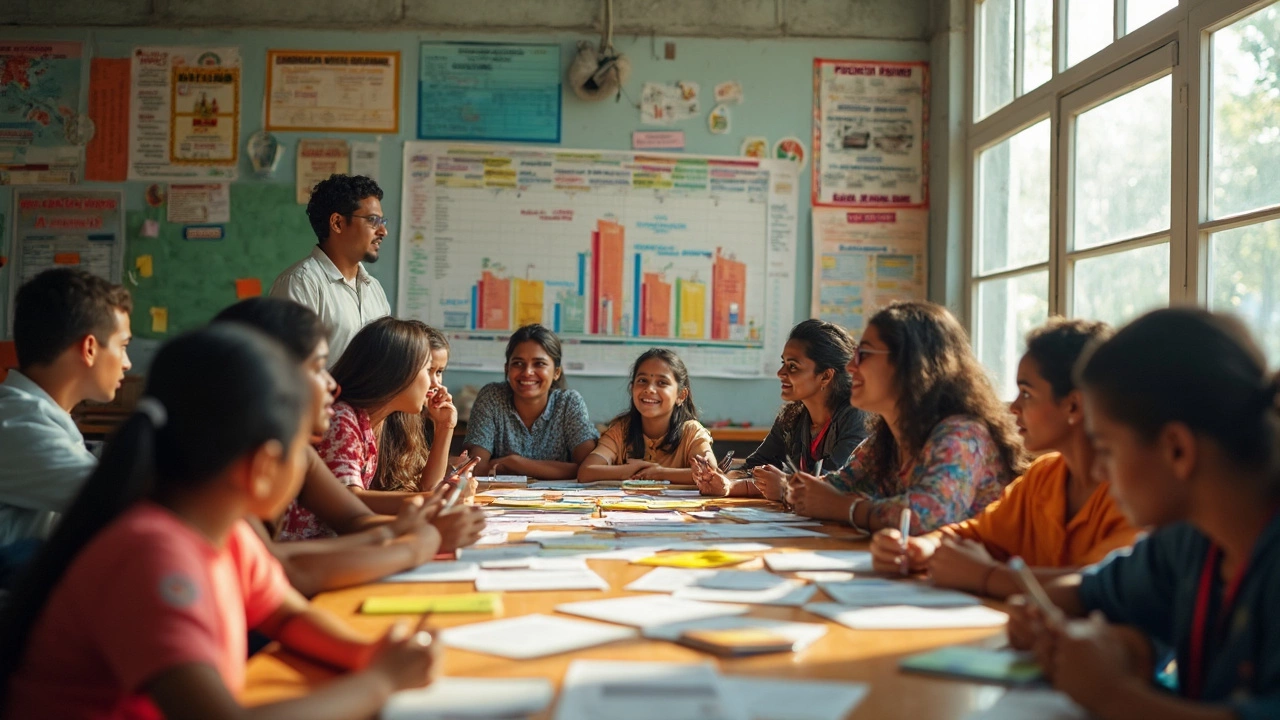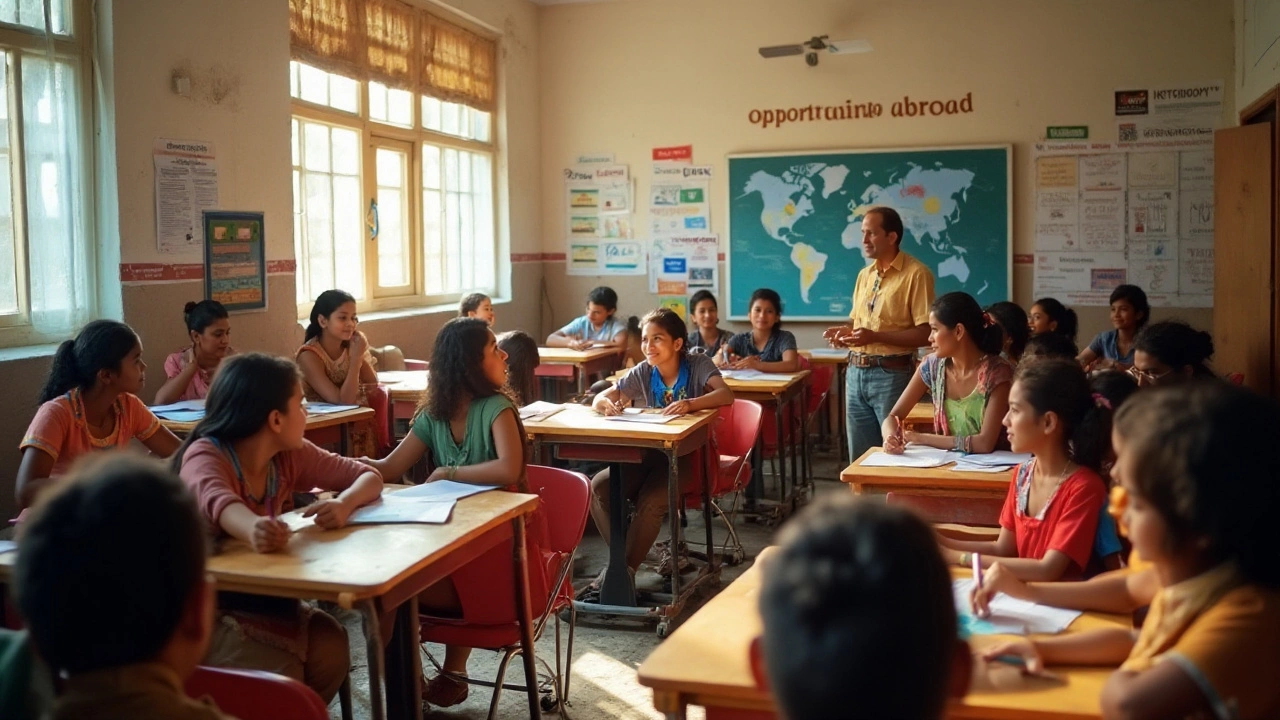Wondering how much time you’ll actually spend on a diploma course in India? The short answer is, it depends – but let’s not dance around it. Most diploma programs here run anywhere from 6 months to 3 years. It really comes down to the type of diploma you choose.
If you’re eyeing a polytechnic or engineering diploma after class 10, be ready for a solid three-year commitment. But short-term diplomas, like digital marketing or hotel management basics, usually wrap up in 6 to 18 months. The difference? Longer diplomas dig deeper and give you the edge for better jobs or higher studies, while those crash courses teach you skills fast so you can jump into work quickly.
Don’t just look at the duration. Think about what fits your routine and long-term plans. Some folks, like my nephew who finished his 1-year graphic design diploma, got hired straight out of his course. Others, like classmates of my daughter Nitya, juggled their studies with internships to get hands-on experience during a 2-year tech diploma.
- How Long Is a Diploma Course in India?
- Factors That Influence Duration
- Types of Diploma Courses and Their Length
- Tips for Choosing the Right Diploma
- What Happens After the Diploma?
- Quick Answers to Common Questions
How Long Is a Diploma Course in India?
If you’re looking at diploma courses India, the first thing to note is how much your life will need to adjust. Most people think of diploma courses as a quick route, but the timeline actually covers a pretty wide range. Here’s how it usually breaks down in real colleges and institutes.
After finishing class 10, polytechnic diplomas (like engineering, pharmacy, or architecture) typically take 3 years. These are full-time and packed with practicals, so don’t expect to work a day job on the side. On the other hand, diploma courses after 12th―such as hotel management, fashion designing, or aviation—usually run for 1 to 2 years.
Shorter programs also exist, especially in trending fields such as digital marketing and graphic design. These can last from 6 months to a year, making them a favorite for anyone wanting to add a skill fast without a multi-year commitment. Here’s a quick look:
| Course Type | Common Duration |
|---|---|
| Polytechnic/Engineering Diploma (after 10th) | 3 years |
| Diploma (after 12th, like Hotel Management) | 1-2 years |
| Short-term Skill Diploma (e.g., Digital Marketing) | 6-12 months |
Part-time and distance diplomas are around too, and their durations vary: you might stretch a 1-year course to 2 years if you’re balancing work or family. Some institutes are flexible, letting students pace themselves if they have legit reasons—though not all colleges are that accommodating.
Some courses run on a semester system, with exams every six months. Others keep things yearly. Your attendance and performance can also impact if you finish on time, since you can’t move ahead if you fail key subjects or miss too many labs.
The takeaway? Duration isn’t a one-size-fits-all deal. Always double-check with the college you’re eyeing to avoid any last-minute shocks. And if you already have some work experience, a few private institutes may even let you opt for fast-track diplomas, shaving a few months off the usual calendar.
Factors That Influence Duration
There’s no one-size-fits-all answer for how long a diploma course in India takes. A bunch of things affect the timeline, and knowing these can actually save you time and hassle later on.
- Field of Study: Tech and engineering diplomas take longer—usually three years—while healthcare and arts diplomas often finish up in a year or less.
- Entry Qualification: The starting point makes a difference. Post-10th diplomas are longer than ones you start after class 12 or graduation. For example, a post-graduate diploma after a bachelor’s degree is often just one year.
- Full-Time vs Part-Time: If you’re working or have other commitments, part-time diplomas stretch the duration, sometimes doubling it.
- Mode of Study: Online and distance learning let you work at your own pace. But if you’re super motivated, you can finish faster than the standard duration.
- Institute Rules: Some colleges stick to a strict calendar, while others have flexible modules. This changes how long you’re in the classroom.
- Internship or Practical Training: A lot of diploma courses bake in work placements or hands-on projects. Sometimes, that extra time spent in the real world adds to the calendar.
Here’s a quick look at how these factors typically line up:
| Factor | Effect on Duration | Typical Time Range |
|---|---|---|
| Engineering/Polytechnic Diploma | Longer | 3 Years |
| Part-Time/Distance Learning | Can be longer or shorter | 1-4 Years |
| Short Skill-Based Diploma | Shortest | 6-18 Months |
| Postgraduate Diploma | Medium | 1 Year |
| Mandatory Internship | Adds a few months | Varies |
Brijesh Kumar, the placement officer at a major Mumbai engineering college, puts it plainly:
“A diploma’s duration isn’t just about the course syllabus. The mode of study, practical training, and even delays in exams all play a part. Students need to know this before signing up.”
One more thing—delays can happen if exams get postponed or if you need to clear a backlog. So ask the college about their past academic calendar and average course completion time before enrolling. That simple question can save you a year if things aren’t well managed.
Types of Diploma Courses and Their Length
Diploma courses in India come in all shapes and sizes. The length depends mostly on what subject you pick and your entry point, like after class 10 or class 12. Here’s a quick breakdown to help you figure out what suits you best.
- Polytechnic Diplomas: These are probably the most well-known. If you do a polytechnic diploma in engineering (like civil, mechanical, or electrical), it usually takes 3 years after class 10. It’s perfect for students who want solid technical skills without going for a full-blown engineering degree.
- Medical and Paramedical Diplomas: These include pharmacy, lab technician, radiology, and nursing aides. Most medical-related diplomas run for 2 years, but pharmacy can stretch to 3 years. Some shorter options cover just 12 to 18 months, great for quick entry-level roles in hospitals.
- Computer, IT, and Digital Skills: These diplomas have boomed lately. Think software development, graphic design, or digital marketing. Some are as short as 6 months (like basic web design), but job-friendly ones, like a diploma in computer applications, typically last 1 year.
- Hotel Management & Tourism: If the hospitality industry grabs your attention, expect diplomas to run for anywhere from 1 to 2 years. They focus more on hands-on training—my friend’s son finished a 1-year diploma and landed an internship at a big hotel straightaway.
- Fashion, Design, and Interior: Creative types, listen up—fashion design, interior design, and similar diplomas usually last about 1 year. Some offer advanced versions that run for 18 months, especially in bigger cities.
Certain programs are called “postgraduate diplomas”—these are for folks who already have a degree. They usually last 1 year and are a solid way to specialize, like in business management or data science.
One thing to watch for is the difference between “certificate” and diploma courses India. Certificates can be over in 6 months or less and are super basic. Diplomas have more depth and are a much better bet if you want a real boost in your job or skills.
If you’re short on time but still want skills that matter, short-term diplomas in things like retail management, web design, or animation can get you industry-ready within 6 to 12 months. The takeaway? Match your goals and schedule to the right length, and don’t get fooled by course names—always check exactly how much time you’ll need to invest before you sign up.

Tips for Choosing the Right Diploma
Picking the right diploma is a big deal, especially with so many options in India these days. If you don’t match your course with your goals, you’ll just waste time and money. Here’s a straight-up, no-nonsense approach to figuring out what diploma’s best for you.
First, ask yourself: what do I actually want out of this? Is it just a job right after finishing, or do you want a strong base for further studies? For example, a diploma courses India search throws up stuff ranging from a 6-month digital marketing program to a 3-year polytechnic diploma. Short ones are great for immediate skills, while longer ones can open doors to advanced degrees or big companies down the line.
Before choosing, check:
- Accreditation: Always check if the institute is recognized by AICTE, UGC, or your state board. No one wants a diploma that isn’t accepted by employers.
- Placements: See which colleges have good placement records. My cousin Kian only applied to places where the last batch had at least 60% campus placements!
- Course Content: Compare syllabus and see if it matches industry needs. You can even ask ex-students online for their take.
- Hands-on Training: A diploma that offers internships or real-world projects is worth way more. Tech and healthcare diplomas score high here.
- Flexibility: If you want to balance work or family, opt for institutes offering evening classes or distance learning. Just make sure such diplomas are actually valued by employers.
Here’s a quick snapshot of popular diploma fields, length, and starting salary to help you stack your options:
| Field | Typical Duration | Avg Starting Salary (per month) in INR |
|---|---|---|
| Polytechnic (Engineering) | 3 years | 18,000 – 25,000 |
| Hotel Management | 1 – 2 years | 15,000 – 20,000 |
| Graphic Design | 1 year | 12,000 – 20,000 |
| Healthcare (e.g. Lab Technician) | 1 – 2 years | 10,000 – 16,000 |
| Digital Marketing | 6 months – 1 year | 15,000 – 22,000 |
Don’t fall for flashy ads or low fees without a background check. Before you send in your application, talk to seniors, read honest reviews online, and visit the campus if you can. If something feels off, trust your gut.
One last thing: always have a backup plan. If your first choice doesn’t pan out, you’ll thank yourself for keeping a second one in mind.
What Happens After the Diploma?
The big question most students face right after finishing their diploma is: now what? The answer really depends on what you want and the field you picked. For a lot of people, a diploma opens up direct job opportunities. Polytechnics, for example, often have campus placement drives where companies hire fresh diploma holders as junior engineers, technicians, or IT support staff. Many of these jobs start you off with a monthly pay between Rs. 12,000 to Rs. 25,000. It’s not sky-high, but it’s solid for starters.
Some diplomas—like those in nursing or paramedical fields—can lead to quick placements in hospitals and clinics. A diploma in digital marketing, on the other hand, can help you land freelance gigs or junior roles right away. The point is, diplomas can get your foot in the door fast without years of study.
If you’re thinking long-term, a diploma isn’t the end of the line. You can jump into higher studies—like moving up to a bachelor’s degree. In many cases, Indian universities let diploma holders enter directly into the second year of a related B.Tech or B.Sc. program through lateral entry. This is super helpful because you don’t have to start from scratch, saving you time and money.
Here’s a quick look at your main options:
- Job After Diploma: Join the workforce straight away, especially if you need to start earning or want on-the-job experience in your field.
- Higher Studies: Apply for lateral entry into a relevant degree program, which boosts your chances of better jobs and higher pay later.
- Internships and Apprenticeships: Some folks spend six months to a year interning, which looks great on your resume and sometimes gets you a permanent job offer.
- Start Your Own Gig: Some diploma courses, like fashion design, graphic design, or digital marketing, give you the skills to freelance or even start a small business.
The choices after a diploma course in India are flexible. You’re not boxed into a single path. Some people work a bit, then decide to study more once they know what suits them best. It’s a smart way to test the waters without wasting years or money on something you’re unsure about.
Quick Answers to Common Questions
If you’re thinking about signing up for a diploma course in India, you probably have a bunch of questions running through your head. Let’s tackle the ones I hear most often—straightforward and without the jargon.
- How soon can I finish a diploma?
The shortest ones are about 6 months—think basic IT, digital marketing, or spoken English diplomas. Most mainstream diplomas, like those in engineering or pharmacy, take 2-3 years. - Is attendance compulsory?
Most traditional colleges do track attendance and expect 75% or more. Online courses are more chill about attendance, but you’ll have to do assignments and exams to pass. - Can I do a diploma after 10th or does it have to be after 12th?
Both options are there. After class 10 you can dive into technical diplomas (like polytechnic), and after class 12 you can go for more specialized fields—fashion design, hotel management, and so on. - Are diploma courses recognized for government jobs?
If it’s from an approved institute like AICTE, UGC, or the State Board, it’s valid for many government jobs. Check the specific job criteria because some jobs ask for full degrees. - How does diploma pay compare to a degree?
On average, diploma holders start with lower salaries than degree holders. But in fields like IT support, healthcare, or automobile engineering, many folks start working sooner, so the gap sometimes closes fast. - Does a diploma allow me to switch to a degree course?
Yes, a lot of universities let you join the 2nd year of degree programs (like B.Tech via lateral entry) if you’ve got the right diploma.
Here’s a quick breakdown of some popular diploma durations:
| Type of Diploma | Eligibility | Typical Duration |
|---|---|---|
| Polytechnic (Engineering) | 10th Pass | 3 Years |
| Diploma in Pharmacy | 12th Pass (Science) | 2 Years |
| Diploma in Computer Applications | 10th or 12th Pass | 1 Year |
| Diploma in Hotel Management | 12th Pass | 1-2 Years |
| Short-term Skill Diploma (like Digital Marketing) | 10th or 12th Pass | 6-12 Months |
If you want flexibility, online diploma courses let you study at your own pace, sometimes finishing even faster if you put in more effort.
Little tip from my own experience juggling my son Kian’s questions after his boards: always check if the institute has proper recognition and what kind of placement support they offer before signing up. The last thing you want is to finish a course and find out companies don’t really value that certificate.


